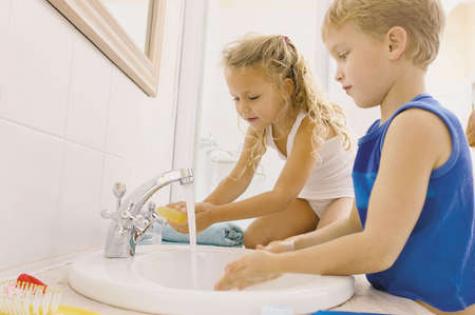A new scientific report challenges the long-held ‘hygiene hypothesis’ that keeping children “too clean” may lead to an increase in allergies.
The research, which was presented to a Paediatrics Conference in Madrid on Friday by Professor Sally Bloomfield, Chairman of the International Scientific Forum on Home Hygiene (IFH) calls for a radical in how we think about cleanliness and hygiene in the home.
The new research agrees with the concept that we need exposure to some types of microbes to regulate our immune system, but challenges the idea that this must include the germs that cause infectious diseases - the notion that children who have fewer infections because of more hygienic homes are more likely to develop asthma and other allergies.
“The key here is that we need to stop talking about being 'too clean' and confusing cleanliness with hygiene,” says Professor Bloomfield who is co-author of the report and also Honorary Professor at the London School of Hygiene and Tropical Medicine.
“We need to help people to distinguish between letting children have contact with their environment and getting dirty while also protecting them, as far as possible, against potentially harmful microbes. For example, we should encourage children to play and interact freely with each other and their environment, but rigorously enforce the need for actions such as hand washing after visiting the toilet, before eating food, after farm visits and so on.”
The report , entitled 'The hygiene hypothesis and its implications for home hygiene, lifestyle and public health', reviewed evidence that has come to light over the last 20 years, since the 'hygiene hypothesis' was first proposed. It set out to examine whether the modern-day approach to home and everyday life hygiene does in fact have any bearing on allergies such as hayfever, and chronic inflammatory diseases such as type 1 diabetes, multiple sclerosis and inflammatory bowel disease, all of which have increased in incidence in recent years.
The researchers concluded that a range of measures introduced over the past 200 years, such as sanitation, cleaner food and water, and antibiotics, have reduced or altered exposure both to harmful germs and to the microbes that regulate our immune system. Together with other contributory factors such as genetics, the modern-day diet, pollution and stress, this is making us more susceptible to allergies and CIDs.
Professor Bloomfield says that exposure to the 'right' kind of microbes is essential, but we must continue to ensure that we keep the 'wrong' kind of microbes - the pathogens that can make us seriously ill.
The ongoing burden of infectious diseases, the greater numbers of people more vulnerable to infection, the problem of antibiotic resistance and the lack of effective vaccines against many infectious diseases mean that infection prevention remains a high priority health issue.
Hygiene, therefore, has an increasingly important role to play, and the IFH report recognises that it must take a higher place on the health agenda.
"Allergies and chronic inflammatory diseases are serious health issues and simplistically talking about 'being too clean' as the cause is ill-advised, because it's diverting attention from finding the true, probably much more complex, causes and finding solutions to the problem" said Dr Rosalind Stanwell Smith, Senior Lecturer at the London School of Hygiene and Tropical Medicine, UK, and another co-author of the report.
“Worrying about 'being too clean' could result in people needlessly exposing themselves and their children to pathogens that can make them ill, which would clearly be dangerous.”
The research proposes that the organisms we require are those that we were exposed to during the stone age when our immune systems were evolving - environmental microbes, the microbes which made up our normal body flora in those times and also worms.
They refer to this refinement of the hygiene hypothesis the ‘Old Friends’ hypothesis.
Professor Bloomfield says this is the basis of a more rational approach to home hygiene, developed by the IFH, known as "targeted hygiene".
The principle of targeted hygiene is to get people to understand the key routes by which harmful microbes are transmitted in our homes and everyday life, and to use hygiene measures like hand washing at the appropriate time to stop germs from spreading.
“By focussing our own and our children's hygiene habits in this way, it minimises the risks of infection, whilst disturbing other microbes, naturally present elsewhere in our environment, to the least extent,” Professor Bloomfield said.
“The IFH recognises that to make a meaningful and impactful change, national and international health bodies, environmental agencies and policy makers need to work together and share responsibility for changing attitudes, understanding and behaviour at all levels of society.”


















__small.png)










